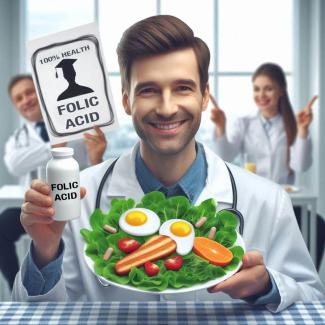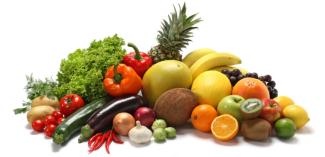
Folic acid, also known as vitamin B9, is a water-soluble vitamin that plays an essential role in many physiological functions in the human body. Its naturally occurring form, folate, is found in a variety of foods, while folic acid itself is often added to supplements and fortified foods. Folic acid is crucial for DNA synthesis, the formation of red blood cells, and cellular division and growth. It is especially important during periods of rapid growth, such as pregnancy, infancy, and adolescence.
The human body cannot produce folate, so it must be obtained through dietary sources. Deficiency in folate can lead to numerous health problems, including anemia, birth defects, and compromised immune function. Despite its importance, many people do not get enough folate from their diet, making it essential to understand both its significance and the dietary sources through which it can be obtained.
This article delves into why folic acid is beneficial for the human body, explores its various health benefits, discusses the potential risks associated with deficiency, and provides a comprehensive guide to folate-rich foods.
Why is Folic Acid Important for the Human Body?
1. Role in DNA Synthesis and Cellular Division
Folic acid is perhaps best known for its role in DNA synthesis. The human body requires folate to produce thymidine, one of the four nucleotide bases of DNA. Without folate, the body cannot efficiently replicate DNA, which hinders cell division. This is especially important during periods of rapid cell division, such as during pregnancy and fetal development, as well as throughout childhood and adolescence.
Moreover, folic acid helps the body repair damaged DNA, a crucial function for preventing errors that could lead to mutations or cancer. When cells divide, they must copy their DNA so that each daughter cell gets a full set of instructions. Without sufficient folate, cells are more prone to DNA replication errors, which can accumulate over time and lead to diseases such as cancer.
2. Supports the Formation of Red Blood Cells
Folic acid is also critical for the production of red blood cells (RBCs), which carry oxygen from the lungs to all parts of the body. Inadequate levels of folate can lead to megaloblastic anemia, a condition where red blood cells become abnormally large and are unable to function properly. These dysfunctional cells cannot transport oxygen efficiently, leading to symptoms such as fatigue, weakness, and paleness.
In combination with other B-vitamins, such as vitamin B12, folate supports the development of hemoglobin, the protein in red blood cells that binds oxygen. This makes folate indispensable for preventing various forms of anemia.
3. Crucial for Prenatal Health and Fetal Development
Folic acid is particularly vital during pregnancy, as it helps prevent neural tube defects (NTDs) in developing fetuses. The neural tube forms the brain and spinal cord during the first month of pregnancy, and inadequate folate intake during this period can result in severe birth defects such as spina bifida and anencephaly. These conditions occur when the neural tube fails to close properly.
For this reason, doctors recommend that women who are pregnant, or who may become pregnant, take folic acid supplements. Studies have shown that taking 400 to 800 micrograms (mcg) of folic acid daily before conception and during early pregnancy can significantly reduce the risk of neural tube defects.
Folate also plays a role in placental development, helping ensure that the fetus receives adequate nutrition. Low folate levels during pregnancy have been associated with preterm birth, low birth weight, and preeclampsia.
4. Supports Brain Health and Cognitive Function
Folate is essential for maintaining brain health and cognitive function across the lifespan. It helps regulate homocysteine levels, an amino acid that, when elevated, has been linked to an increased risk of cognitive decline, Alzheimer’s disease, and dementia.
Research has demonstrated that individuals with higher folate levels tend to have better cognitive function and memory performance as they age. Low folate levels are also associated with an increased risk of depression, possibly due to its role in producing neurotransmitters such as serotonin, which regulate mood.
5. Helps Reduce the Risk of Cardiovascular Disease
Folic acid plays an essential role in reducing levels of homocysteine in the blood, which is important for heart health. Elevated homocysteine levels are linked to an increased risk of cardiovascular diseases such as heart attacks, stroke, and arteriosclerosis (hardening of the arteries).
Several studies have found that folic acid supplementation can help reduce homocysteine levels, thus lowering the risk of heart disease. In some cases, folic acid supplementation is recommended for individuals at high risk of cardiovascular disease, particularly when combined with other B-vitamins like B12 and B6.
6. Supports Immune Function
Folic acid is involved in the production and function of white blood cells, which are essential for a healthy immune system. A deficiency in folate can lead to a weakened immune response, making the body more susceptible to infections.
Folate also supports the function of lymphocytes, a type of white blood cell that plays a key role in the immune response by targeting and destroying foreign invaders such as bacteria, viruses, and cancer cells.
7. Aids in Protein Metabolism
Folic acid helps in the breakdown and metabolism of proteins. One of its key roles is to convert the amino acid homocysteine into methionine, which is a building block for many proteins. Elevated homocysteine levels are associated with increased risks of cardiovascular diseases and may cause damage to blood vessels.
Methionine also plays a role in various cellular functions, such as the production of S-adenosylmethionine (SAMe), a compound involved in methylation processes that regulate gene expression and neurotransmitter production.
What Are the Consequences of Folic Acid Deficiency?
1. Megaloblastic Anemia
One of the most well-known consequences of folic acid deficiency is megaloblastic anemia, a condition characterized by the production of abnormally large red blood cells that cannot function properly. This results in symptoms such as fatigue, shortness of breath, weakness, and irritability.
Megaloblastic anemia can be caused by either a deficiency in folate or vitamin B12, both of which are necessary for red blood cell production and DNA synthesis. In severe cases, anemia can lead to heart palpitations, fainting, and even heart failure.
2. Birth Defects
Folic acid deficiency during pregnancy is one of the leading causes of neural tube defects in newborns. These defects occur in the early stages of pregnancy, often before a woman knows she is pregnant. This is why many health organizations recommend that all women of childbearing age consume adequate amounts of folic acid, either through diet or supplements.
3. Cognitive Decline
As mentioned earlier, low folate levels have been linked to cognitive decline, particularly in older adults. Some studies suggest that folic acid supplementation can help improve memory and reduce the risk of conditions like dementia and Alzheimer’s disease.
4. Increased Risk of Cardiovascular Disease
Folate deficiency is associated with elevated homocysteine levels, which increases the risk of atherosclerosis, heart attacks, and stroke. Without enough folic acid, homocysteine levels can rise to dangerous levels, leading to damage in the blood vessels and an increased risk of cardiovascular problems.
5. Compromised Immune Function
Low levels of folate can impair the immune system's ability to produce sufficient white blood cells, leading to an increased susceptibility to infections. This can be particularly concerning for individuals with preexisting health conditions or those undergoing treatments like chemotherapy, which already weaken the immune system.
Foods Rich in Folic Acid
Folic acid and folate are found in a wide variety of foods, both natural and fortified. The following is a list of foods rich in folate:
1. Leafy Green Vegetables
Leafy greens are among the best natural sources of folate. Examples include:
- Spinach: One of the most folate-rich vegetables, with a cup of cooked spinach providing about 263 mcg of folate (66% of the Daily Value).
- Kale: Another excellent source, containing around 85 mcg of folate per cup.
- Romaine lettuce: Offers about 64 mcg per cup.
2. Legumes
Legumes are another excellent source of folate. These include:
- Lentils: A half-cup of cooked lentils provides about 179 mcg of folate.
- Chickpeas: A half-cup of chickpeas offers around 140 mcg of folate.
- Black beans: Contain about 105 mcg per half-cup.
3. Fruits
Some fruits are also good sources of folate, including:
- Avocados: One avocado provides around 163 mcg of folate.
- Oranges: A medium-sized orange contains approximately 40 mcg of folate.
- Bananas: A medium banana offers about 23.6 mcg.
4. Fortified Cereals and Grains
In many countries, certain foods are fortified with folic acid to prevent deficiency, including:
- Breakfast cereals: Many are fortified with 100% of the Daily Value for folic acid per serving.
- White rice: Fortified rice can provide a significant amount of folic acid, around 90 mcg per cup.
- Pasta: Many pasta products are fortified with folic acid, providing around 100 mcg per serving.
5. Meat and Animal Products
Although plant-based foods are often richer in folate, certain animal products contain folic acid:
- Beef liver: One of the most folate-dense animal products, with a 3-ounce serving providing about 215 mcg of folate.
- Eggs: A single egg provides around 22 mcg of folate.
6. Nuts and Seeds
Certain nuts and seeds also contain folate:
- Sunflower seeds: A quarter-cup provides around 82 mcg of folate.
- Flaxseeds: These contain about 54 mcg per 2 tablespoons.
7. Other Vegetables
Other vegetables that are high in folate include:
- Asparagus: A half-cup of cooked asparagus provides around 134 mcg of folate.
- Broccoli: A cup of cooked broccoli contains about 104 mcg.
8. Enriched Bread and Pasta
Many bread and pasta products are fortified with folic acid to ensure adequate intake, particularly in regions where natural folate consumption may be low.
9. Dairy Products
Certain dairy products, such as cheese and milk, contain small amounts of folate. However, they are generally not considered primary sources of folate compared to plant-based foods.
Folic Acid Supplementation
While it’s possible to obtain sufficient folate through a healthy diet, certain individuals may benefit from folic acid supplementation. These include:
- Pregnant women: To reduce the risk of birth defects, many health organizations recommend that pregnant women take 400 to 800 mcg of folic acid daily.
- Individuals with malabsorption disorders: Conditions like celiac disease, Crohn’s disease, and ulcerative colitis can impair the body’s ability to absorb folate.
- Older adults: As people age, their ability to absorb nutrients from food declines, making supplementation beneficial.
Folic acid supplements are available in various forms, including standalone folic acid tablets or multivitamins containing folate and other B vitamins.
Folic acid is a critical nutrient that plays an essential role in DNA synthesis, red blood cell formation, and prenatal development, among other functions. A diet rich in folate from leafy greens, legumes, and fortified foods can help prevent deficiency and its associated health risks. For certain populations, folic acid supplementation may be necessary to meet daily requirements.
Ensuring adequate intake of folic acid is crucial for maintaining overall health, particularly for women of childbearing age, individuals at risk for cardiovascular disease, and those with certain medical conditions. By understanding the importance of this vitamin and the best food sources, individuals can make informed decisions to support their long-term well-being.






